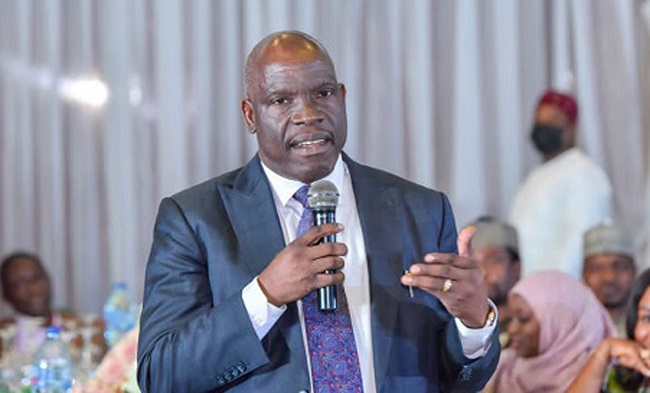The Commission Chief Executive of the Nigerian Upstream Petroleum Regulatory Commission (NUPRC), Mr. Gbenga Komolafe, has called for unwavering commitment to eradicate corruption, particularly in Nigeria’s vital oil and gas sector.

Komolafe made the call at a workshop organised by the commission to mark the International Anti-corruption Day on Monday, December 9, 2024, in Abuja.
The theme of the event is “United Against Corruption: Building Integrity for a Sustainable Future.”
Komolafe described the consequences of corruption, as a significant threat to the nation’s development and equity.
“Corruption deprives citizens of essential services, discourages investments, and erodes trust in public institutions, thus the importance of safeguarding the upstream petroleum industry,” Komolafe added.
He outlined transformative measures implemented by the NUPRC, such as the Oil and Gas Industry Service Permit (OGISP) portal, competitive bidding for petroleum licenses, and the HostComply platform, which have strengthened transparency and governance.
Komolafe praised the Anti-Corruption and Transparency Unit (ACTU) of the NUPRC for fostering a culture of integrity through awareness campaigns, system reviews, and whistleblowing mechanisms.
“These efforts have not only enhanced investor confidence but have also increased revenue inflows to the Federation Account,” he said.
Komolafe emphasised the importance of leadership in combating corruption, urging stakeholders, including government agencies, industry operators, and civil society, to unite in the fight against the menace.
“We must collectively ensure that Nigeria’s oil and gas resources become a blessing for all, not a privilege for a few. I urge Nigerians to embrace transparency as a personal and collective creed,’’ he said.
The NUPRC boss during the event recognised some outstanding staff members of the commission that had shown commitment to integrity with integrity awards.
The renowned Human Rights Activist and Senior Advocate of Nigeria (SAN) Femi Falana, on his part, challenged Nigerians to confront systemic corruption with bold reforms and decisive action.
Falana acknowledged the progress made by anti-corruption agencies like the ICPC and EFCC but emphasised that “corruption thrives where leadership lacks commitment.”
He called for a stronger political will to enforce existing anti-corruption laws.
Falana acknowledged the global complicity in perpetuating corruption, criticising Western nations for harboring stolen funds.
“The bulk of looted resources from Nigeria is warehoused abroad. Yet, these countries frustrate recovery efforts, betraying the ideals of the United Nations Convention Against Corruption,” he stated.
He also advocated for the redistribution of seized assets, suggesting that properties confiscated from corrupt officials be converted into affordable housing for Nigerian workers.
He reiterated the power of young Nigerians, particularly through social media, to drive anti-corruption campaigns, saying “If we can mobilise our youth to demand transparency and accountability, significant progress will be made”.
He also advocated for the redistribution of seized assets within the country, suggesting that properties confiscated from corrupt officials be converted into affordable housing for Nigerian workers.
Falana praised the NUPRC boss and its management for its transparency initiatives, urging other government institutions to replicate these efforts.
“Your leadership sets a precedent for fostering accountability and resisting undue influence,” he said.
Representing Dr Musa Aliyu, Chairman, Independent Corrupt Practices and Other Related Offences Commission (ICPC), Mr Adigun Olusegun, lauded the NUPRC for its proactive anti-corruption initiatives.
“The establishment of the Anti-Corruption and Transparency Unit (ACTU) within organisations like NUPRC ensures the implementation of preventive mechanisms, fostering an ethical workforce and addressing lapses in operational systems.
“It is therefore important to sustain these efforts. We encourage ACTU to remain steadfast in its mandate while urging management to continue its unwavering support,’’ Aliyu said.
Delivering a paper on “Understanding and Mitigating Corruption in the Workplace, Mr Chidi Orji of ICPC said corruption eroded public trust and compromised critical sectors such as healthcare, infrastructure, and economic development.
“Corruption does not just affect the poor or the powerless; it impacts everyone, including its supposed beneficiaries.
Citing examples of procurement fraud and regulatory capture, Orji called for more rigorous enforcement and transparent processes, particularly in sectors prone to exploitation.
He said there was the need for technology-driven solutions to minimise human intervention in regulatory processes.
“We must innovate and adopt systems that eliminate opportunities for unethical practices, especially in sectors like oil and gas, where the stakes are high.
“Leadership must lead by example and the fight against corruption begins with ethical behavior from the highest levels of management and cascades down through all organisational layers.
“Corruption does not pay, it affects us all, and only by standing united can we shape a future of integrity and accountability,” he said.
By Lucy Ogalue
